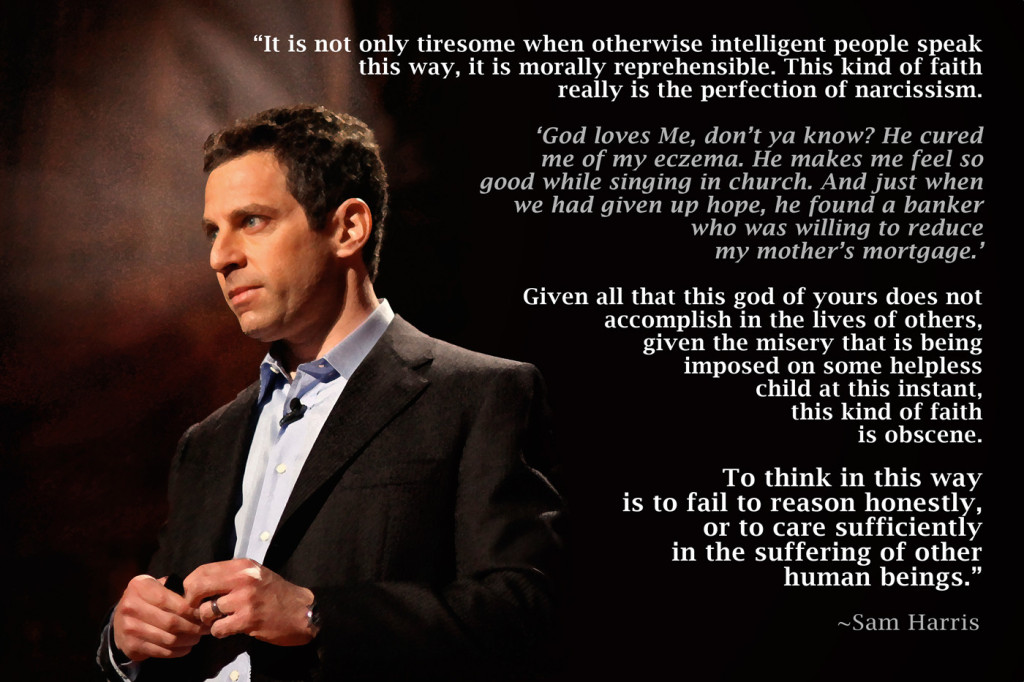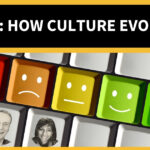by Jeff Salzman
God knows I loves me my Sam Harris! And no, it’s not just because he’s a hunk (although he is – Jesus!).
It’s because Harris (along with many others, among them Richard Dawkins and the late Christopher Hitchens), has spearheaded what is now a flourishing intellectual and political movement: New Atheism. I see this as a welcome development in the story of cultural evolution … and heck, I’m not even an atheist.
With the New Atheist movement, mainstream society is granting respectability to a label and worldview that not so long ago was seen as self-evidently immoral (“you can’t have morality without God”), and indeed dangerous. The New Atheists are making these gains by essentially turning the tables on believers, saying, “You are the ones who are in moral trouble. The belief that your God-of-the-Universe favors the well-being of some over others, that is the real moral outrage.”
This is world-centric morality confronting ethno-centric morality, and it’s an argument that has great traction with the huge strata of population who have a modernist sensibility even though they may have religious sympathies as well.
Evolutionary theory helps us unpack this. The New Atheists rightly confront the ego-centric God (Warrior Stage), who serves as a kind of superhero granting wishes, touchdowns etc., and the ethnocentric God (Traditional Stage), who helps his people prosper.
The first of these Gods, the egocentric God, is an extension of one’s own power.
My friend Maria tells of her high-school conversion to Christianity (sparked at a Billy Graham rally), which lasted exactly as long as it took for her to realize that no amount of praying would get Martin Stein to ask her out on a date. She’s been an atheist ever since.
Now, of course, she could have just grown as a Christian. Most Christians do not stay in the egocentric, God-as-superhero (Warrior God) stage of development either. They move to a larger God, the ruler-god, king of his people (Traditional God). This requires the egocentric God to be surrendered to the God of the larger family, church and religious body. In this way, the believer develops through the warrior stage to the traditional stage.
But even the larger traditional-stage God favors the people of his religion more than people of other religions. The eschatology of traditional-stage religions generally promises that the believers will prevail over the non-believers and usher in a sacred world where God (their god) reigns supreme.
It is the Warrior God and the Traditional God that the new atheists are taking on so successfully in the larger culture, and which Harris critiques with such devastating effect as in the illustration below (which is user-generated art from the Reddit subgroup r/atheism, a smart, if kooky, virtual gathering place for new atheists).
Harris’s views resonate with the modernist-stage view, which is rational and secular, and the postmodern view, which is relativistic and pluralistic. But, of course, we evolutionaries see a further developmental stage unfolding, the Integral Stage, which embraces the best of all the previous stages in a new, more complex and flexible structure.
Can this emerging Integral Stage accommodate the claims of both rationality and spirituality, which are typically at war? Yes, as an Integralist I can see the deep truth of the scientific explanation of our world, as well as its limits. Science can explain how things work but says nothing about why they work. The spiritual view, on the other hand, infuses the world with meaning, enchantment and purpose, but is often ignorant of concrete facts and proof. Either view alone is partial and unsatisfying. Integrate them, however, and we start to get somewhere.
To practice, contemplate this line from Ken Wilber:
“Dirt got up and wrote poetry.”






